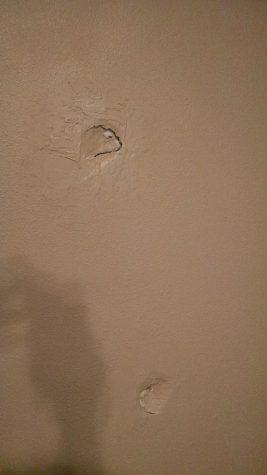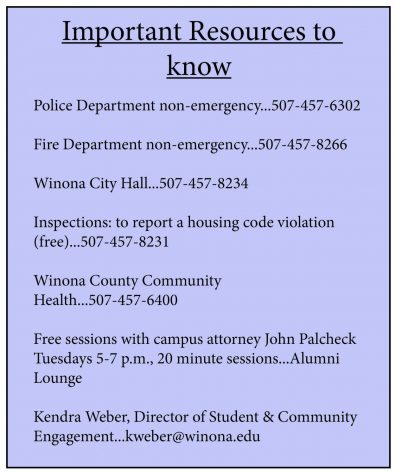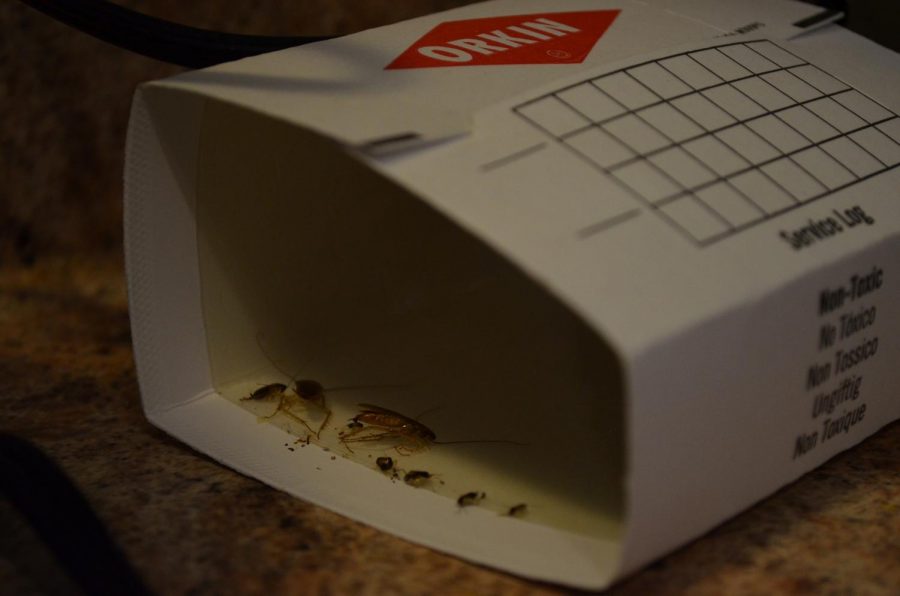Students vs. Landlords: a never-ending battle
An in-depth look at the struggle to find quality housing
A bug trap found uncleaned by a landlord who’s tenants have said does “the bare minimum to fix the issue” that has persisted since September 2017. Dwight Casper is one of many Winona landlords who supposedly do not do their part to make their properties livable for students who rent, causing much unnecessary stress and uncomfortable housing situations
January 24, 2018
Cockroaches, falling ceilings and trees in your foyer, chances are as a college student you have endured a bad college housing experience.
Jennifer Manglos, a senior communication studies major, experienced a fallen ceiling and a moldy mattress from a faulty air conditioner.
Manglos rented with Winona Property Management from 2016 to 2017, at a convenient place near Midtown Foods with three roommates.
“It was a unique layout, with hardwood floors,” Manglos said. “But honestly, my roommates and I did not want to go out and search for more places because the rent was affordable.”
However, one evening while she was sleeping, Manglos was scared awake by a loud crack. In the corner of her room, the ceiling suddenly fell. Pieces of plaster had fallen everywhere, coating all her things in dust.
Manglos said it took a couple of weeks for Winona Property Management to get in and fix the ceiling, and when they did come, she was not given a 24-hour notice. Instead she received a text message five minutes before the maintenance person came at 8 a.m., while she was still getting ready for the day.
“He had to move around all my junk because it got all my stuff dirty and dusty,” Manglos said. “I didn’t get a chance to clean up my stuff before he came to fix the entire ceiling.”
Michelle Alexander of Winona Property Management has another story about the situation.
“We went over the next day and cleaned it up,” Alexander said. “I think what students don’t understand is that I have to call a professional to come in and they are not always available in that minute. We ask the tenant if they want us to fix it as soon as possible, and that is when they only get a five-minute notice. In that instance, I was given permission to come in as soon as possible and make the repair because it was an emergency situation.”
When Manglos moved in, Winona Property Management had to completely redo the only bathroom in the house. She and her roommates had to use the bathroom in the neighboring unit of the building for a month.
“It was really uncomfortable to shower and use the bathroom with construction workers coming and going,” Manglos said.
Mike and Michelle Alexander, father and daughter in the family business, choose to have a three-day period between tenants moving out and tenants moving in. They do this because they don’t want tenants to be without a home for very long, so sometimes construction projects can happen while tenants are living there.
Before renting with Winona Property Management, Manglos rented with Karen Weigel, who only owns a single property, unlike Winona Property Management who rents to around 250 tenants.
While living at that property, Manglos experienced an air conditioner that ventilated moisture into the house, causing everything in the home to become damp. When she was packing up to move out, she discovered her mattress was moldy.
“I didn’t know what to do with the mattress, I didn’t have a car to move it easily, so I left it by the trash outside,” Manglos said. “Karen told me I had to take care of it, so I told her it was her fault the mattress was moldy. I had to rewash and dry all my clothes because of the smell.”
Manglos ended up buying a cheap mattress from Ikea to replace the one she lost.
“It was frustrating,” Manglos said. “I couldn’t afford a nice new one, so I had to get a cheap uncomfortable mattress. I loved my old one.”
Manglos’ tale ends with a positive note; she now lives in her own apartment at Park View apartments and loves it.
“Living in an environment like those added so much unnecessary stress,” Manglos said. “I was constantly stressing over my living situation. It didn’t feel like home, it was just a place to store my stuff…now I am keeping my current apartment. I recommend Bluff City Properties to anyone. Even if the rent is more expensive, it is worth every penny to live stress free.”
Another example was given by a student who wishes to remain anonymous.
The student has had a bug infestation in her duplex since September 2017. According the the student, her landlord, Dwight Casper, has done the bare minimum to fix the issue.
“He has called Orkin a couple of times,” the student said. “Otherwise not much has been done. It was bad when we found it so I feel like it’s been going on for a while and he knew that.”
The student also mentioned that Casper sprayed for the bugs when the girls first reported the issue.
Besides the bugs, the student mentioned a pile of garbage in the backyard by the garage. Though it may be annoying and gross, the student said it doesn’t affect her. She doesn’t feel like she can say anything about the garbage in the backyard because it is his property.
Overall, the student stated that she thinks he is a nice guy, but she doesn’t think that he gives his properties the attention they deserve.
“I think he is a decent enough guy and I think he has been nice when talking to us,” the student said. “I just don’t think he puts in the care and the effort in his properties that he should. I think he lacks in the area of making sure his building is clean.”
Someone who understands the student’s feelings with a landlord’s lack of effort in his properties is Kathryn Oakland.
Oakland had trouble finding a place to rent with her roommates because not a lot of places allow animals and Oakland had to find a place that allowed her cat. After some searching, they found a place in their price range, allowing their pets as well. The landlord, Scott Kromminga, showed Oakland the top and bottom units of a duplex. They decided to rent the bottom unit.
Upon moving in, Oakland thought she smelled mold. The ceiling in the kitchen then fell through after something was leaking in the upstairs unit. Kromminga put a patch on it, and the water began leaking around the patch.
“The water leaked all over our food and dishes. We constantly had to re-clean everything,” Oakland said. “Sometimes the leaking wouldn’t stop and we had to place buckets around to catch the water.”
Other issues Oakland experienced were exposed wires, risen up floorboards and rain coming in through the windows that were not sealed properly. Kromminga didn’t keep up with lawn maintenance and a tree started growing out of the roof in the entryway.
“It created holes in the roof,” Oakland said. “The city told him to take care of it because water was coming into the entryway making it wet. When he finally came to look at it, it had frozen so he threw a tarp up there. It worked fine for the winter, but when spring came he never fixed it.”
After putting up with the issues for five months with no help from Kromminga, Oakland had a city inspector come in. She was hoping to have the inspector see the conditions and make Kromminga fix the issue or fine him. However, she found out her living there wasn’t even legal. The city inspector gave her and her roommates 48 hours to move out.
“We had to pack up and leave,” Oakland said. “We stayed at a hotel for three days. The city inspector helped us find a new rental. We moved in to a place with Bluff City Properties, and so far, they have been great.”
The reason why the rental wasn’t legal was because of a Winona City Ordinance that says there can only be a certain number of rentals per block. Kromminga did not have the place legally listed as a rental, only listed as a rental for his family.
“I am so lucky to have family and friends to help me out with the quick move,” Oakland said. “I had to miss work, find people to cover my shifts and stash all my stuff in people’s cars and anywhere there was room. The inspector was also very helpful.”
In September of 2017, Oakland and her roommate decided to take Scott Kromminga to court, in hopes of getting all the rent and deposit money back. Kromminga did not give the security deposit money back to them, and did not give a reason why he took the money. They tried contacting him multiple times, with no reply. The court date was set for November 2017. According to Oakland, it was a long and frustrating process for her and her roommate.
After going to conciliation court, the two did not get all their money back, which would have been around $5,000. However, Oakland got $775 and her roommate received $530.
“We had to compile all the evidence we could to bring to court,” Oakland said. “We had to make sure all our t’s were crossed and our i’s were dotted. Luckily, I had my roommate with me through the whole process.”
Oakland said there was a level of disappointment with not getting more financial compensation for her suffering, but she will be waiting for the first check in the mail.

Tenants unsuccessfully tried to repair damage caused during their lease. According to local landlord Bob Wick, professionals were eventually called into fix the holes.
On the other side, Mckayla Urbick and Sara Junko are two students who have had good fortune with their first landlord in Winona. They are currently renting from Bob Wick of Arrow Investments LLC. However, most people know them as Arrow Apartments.
“They almost treat us like their own kids,” Junko said. “They want us to have a nice house to live in where we don’t have to worry about things breaking or any of that.”
However, they did have an issue with the basement flooding, but Wick had a plumber there to fix it within 20 minutes. Wick and his wife also cleaned the entire basement for the girls.
The roommates have also locked themselves out a few times and Wick has driven from Rushford, Minnesota to unlock the door.
“Our business model is to give the college kids a nice place at a reasonable price and have them be happy and stay for three years,” Wick said.
Michelle and Mike Alexander hope that students are respectful when renting, after having experienced multiple destructive tenants.
“It is just disappointing when we have to clean up destruction such as broken windows and doors. Once we had five tenants cause $25,000 in damages to a property,” Michelle said. “We have seen everything after 40 years in the landlord business.”
The two want to build a positive relationship with their tenants, so there will be good communication between them and their renters.
Scott Hansen is the president of WSYou/Bluff City Properties, the largest student housing provider in town, renting to over 700 students every year. He says like any business, there are good and bad landlords.
“In our experience, if you provide clean, updated, quality properties, you will attract more discerning student renters who will only live in a nice place. We have found that students appreciate quality, and when their lease is up, they are much more likely to leave it in the condition they found when they moved in,” Hansen said.
Landlords can experience issues with their tenants as well. But often times they are more experienced in the business of renting than the first-time renters students usually are. Since the tenant is most often the one who seeks out a rental, there are many things that a tenant can do to try to weed through the many landlords of Winona.

Kendra Weber, director of student and community engagement, said that the biggest thing to look for in a landlord is good communication skills.
“Good landlords are going to be really upfront about having a lease that is clear and answering any questions you have about anything that seems unclear on the lease,” Weber said.
When on a housing tour, make sure that there is a carbon monoxide and smoke detector, check to see if there are deadbolts on the doors and that the keys cannot be duplicated.
Weber said that students should also look at what the curb appeal is like. If shutters are falling off or there are dead shrubs it might be a clue that the landlord doesn’t pay attention to the bigger issues in the house.
She also suggested to ask if there have been issues with the property before and to call the utility company.
“In my experience the good landlords are the ones who have everything as clear as possible in their lease and are welcoming to any questions that you ask,” Weber said. “They wouldn’t treat it like it’s a dumb question, they don’t seem like they are irritated that you asked.”
Hansen says it is important to remember to read the lease carefully before you sign it and ask a lot of questions. Don’t sign anything that you do not understand.
When renting for the first time, many college students sign a lease without knowing their tenant rights. Often times they go in blindly looking at rentals, and once move in day comes, every day after might become a horrible situation.
For legal advice from a professional, make a free appointment with lawyer John Plachecki, who is on campus in the Alumni Lounges on Tuesday evenings from 5-7 p.m. There are basic laws and rights every tenant should know.
According to Plachecki, a lease is a contract of adhesion, meaning you quickly sign it before realizing what it said. To sum it up, a lease is an agreement to exchange money for a habitable place to live. If you are residing somewhere that is not habitable, you have the right to leave.
“A lease does not need to be set in stone,” Plachecki said. “Read the lease fully, discuss some of the paragraphs with the landlord and possibly negotiate changes.”
Another important law to remember is Minnesota statute 504B.211 Residential Tenant’s Right to Privacy. In this law, under subdivision two, a landlord may only enter the premises for a “reasonable business purpose and after making a good faith effort to give the residential tenant reasonable notice under the circumstances of the intent to enter.” Under subdivision five, if the landlord enters the premises while tenants are not there, they must leave a written note. If subdivision two is violated, a tenant is entitled to a rent reduction up to a full cancellation of the lease, recovery of any damage deposits, and up to a $100 civil penalty for each violation. If subdivision five is violated, a tenant is entitled to up to a $100 civil penalty for each violation.

One of the problems facing both tenants and landlords is when one party does not clean properly, like the above freezer which greeted landlord Bob Wick while doing end of lease cleaning checks. Most leases have costs that tenants have to pay if they do not clean the apartment properly before leaving.
Another common issue that college student tenants run across are issues around security deposits, such as when can the landlord take the money and how many days do they have to return your deposit once you move out.
“Security deposits are not meant to cover wear and tear of living at the rental,” Plachecki said. “It does cover a keg size hole in the wall though.”
A landlord has 21 days to return your security deposit or to give you a documented reason for why they will not be returning your deposit money. Landlords are not entitled to take your security deposit for ordinary wear and tear, according to Plachecki. If the landlord fails to return your security deposit in 21 days after you have moved out, they have violated Minnesota Statute 504B.178 Subdivision Seven, and will be required by law to pay a fee of $500 for each deposit that was not returned.
When you move out of your rental, you are entitled to contract interest, according to Plachecki, even if your landlord returns your deposit in a timely matter. Minnesota law states you are entitled to one percent interest rates on your deposit.
When you move in, be sure to take photos of the property to document the condition. These records could be used for possible legal evidence. If your landlord wants to take money from your security deposit to cover the problem when you move out, you then have record that you or your roommates did not cause it. Upon signing the lease, go through the rental and point out any noticeable damages so you will not be held accountable in the future, Plachecki suggests.
Students should not be afraid of dealing with an unfavorable living condition. College is already stressful without having to go home and worry about the ceiling falling, unrecognizable bugs and foliage in your foyer. Know your rights and the laws, they are in place to protect you.






































